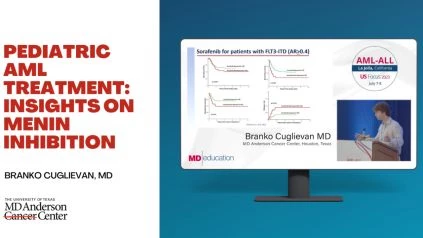Branko Cuglievan, MD- Assistant Professor, Department of Pediatrics Patient Care, Division of Pediatrics, The University of Texas MD Anderson Cancer Center, Houston, TX – Section Chief, Leukemia/Lymphoma, Department of Pediatrics Patient Care, Division of Pediatrics, The University of Texas MD Anderson Cancer Center, Houston, TX
Branko Cuglievan, MD, expresses gratitude for being invited to an adult conference to discuss pediatric data and challenges. He addresses the differences in age distribution between acute myeloid leukemia (AML) and pediatric leukemias. Dr. Cuglievan emphasizes the lower incidence of pediatric AML cases and the struggle to enroll sufficient patients for studies due to the dispersed nature of pediatric cases across various clinics. He mentions the lack of significant improvement in AML outcomes over the past two decades despite efforts to enhance treatment strategies, discussing treatment trials, target therapies, and the challenges in treating pediatric AML uniformly due to limited patient numbers. Dr. Cuglievan concludes by advocating for the timely inclusion of pediatric patients in trials, highlighting the benefits of shared studies for both pediatric and adult oncology.
He also discusses the incorporation of menin inhibition in AML treatment and its potential impact. Dr. Cuglievan highlights the varying responses and side effects in pediatric patients, presenting case examples. He raises questions about the optimal timing and combination of therapies involving menin inhibition and other treatments. Dr. Cuglievan emphasizes the need for collaborative efforts between pediatric and adult oncology to accelerate advancements and improve outcomes for both age groups. Finally, he mentions recent changes allowing the inclusion of patients aged twelve and up in studies, underlining the importance of including pediatric patients in research to enhance the field’s progress.

